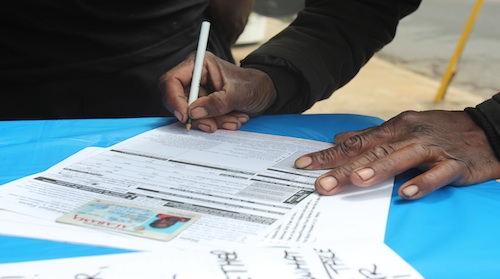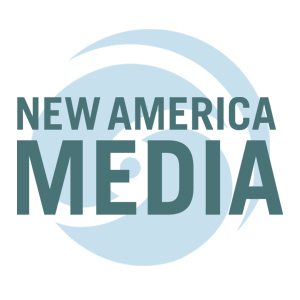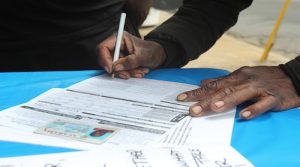DNC Worry’s About Voter Suppression

 By Anthony Advincula, New America Media
By Anthony Advincula, New America Media
“It’s going to be a big impact on the Democratic vote,” Ben Jealous, president of the National Association for the Advancement of Colored People (NAACP), said right after the voting rights caucus on the last day of the convention. “This is fundamentally anti-democratic.”
Jealous said that while there are challenges for many eligible voters, such as securing a birth certificate and managing extra costs, it makes more sense to comply with “the Republicans demand” by having an ID during the election and, at the same time, continue the legal battle in the court.
“The time is critical and we must act together,” he said. “Voter ID laws would impact mostly the minority, low-income and first-time voters.”
While courts had recently struck down key provisions of voter-suppression laws in Texas, Florida, South Carolina and Ohio, there are remaining states with strict photo ID requirements such as Georgia, Kansas, Indiana and Tennessee.

In Pennsylvania, which is a highly contested swing-vote state, the lower court just upheld the voter ID law on August 15 — and its fate is now in the Supreme Court.
According to the Pennsylvania Department of Transportation, about 9.2 percent (759,000) of the state’s 8.2 million registered voters do not have a state driver’s license.
That number is critically significant for Obama, analysts say, as he won the state in 2008 with only a slim margin of victory of 620,478 votes. Similarly, Obama took North Carolina in the previous presidential election by less than one percent.
“It [voter-suppression laws] could certainly decrease our vote— and that’s the intent,” said Arlene Holt Baker, AFL-CIO executive vice president. “The Republicans know that 11 percent of Americans don’t have IDs, and that 18 percent of young Americans between 18 and 24 have some issues with their government-issued ID.”
But Baker said that while time may be short, the coalition of civil rights groups and supporters “will do by all means necessary” to educate voters and combat the damage of voter ID laws on Obama’s voter turnout.
“We will do this collectively,” she said. “We will make sure that they will be able to cast their vote and save our democracy.”
Other voting rights advocates and members of civil rights groups who attended the voting rights caucus include Judith Browne-Dianis of the Advancement Project, MSNBC’s political analyst Melissa Harris- Perry, and actress America Ferrera.
Osman Ahmed, the only black delegate from Utah, said that he is aware that voting rights laws are detrimental to Obama’s campaign but he is “not worried about the popular vote. Obama will surely win. But I’m more concerned about the electoral votes, especially in swing states.”
When he gets back to his state, he said that he and thousands of other Democratic delegates across the country have a lot to do by “calling and reaching out to registered voters” to make sure they secure the proper ID to vote.
Donna Brazile, chairwoman of the Democratic National Committee, recognized that voter laws have made this year’s election even more difficult for the Democrats. These laws, she said, have only resurfaced after Obama’s election.
“If we thought 2001 was a nightmare on the voting rights front, well, 2012 is even worse,” Brazile noted in her remarks at the caucus. “We don’t need to pull our utility bills to cast our ballot. But this is really up to us.”
This article was first published in New America Media.
[Photo by n andersen/New Ameria Media]
